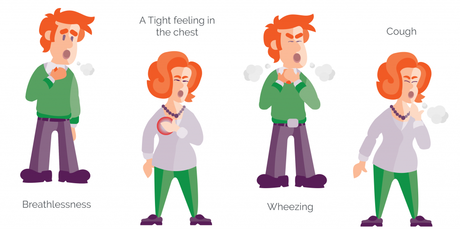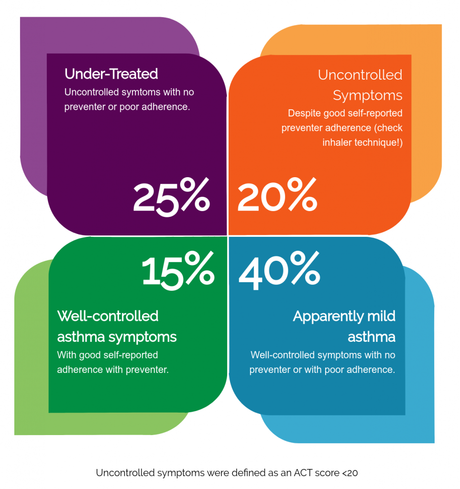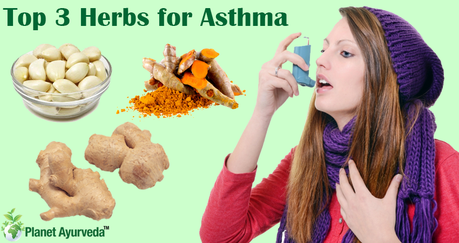Introduction
Asthma is a chronic respiratory disorder, defined as the reversible narrowing of the bronchioles through inflammation of the mucus membranes or contraction of the diaphragm.
Symptoms of Asthma
- Asthma has visible symptoms like difficulty in breathing, shortness of breath, chest tightness, coughing, wheezing with excessive phlegm or mucus. Asthma is common with both children and adults.

Asthma Triggers
- Asthma attack occurs when there is some kind of obstruction in the flow of air in the lungs.
- Some common triggers are allergies, air pollution, humidity in air, physical activity, certain medications, strong emotions , and sulfites or preservatives in food.
Types of Asthma
- Extrinsic or Atopic Asthma and Intrinsic or Nonatopic Asthma.
- The Atopic Asthma is closely linked with the presence of hay fever, eczema, hives and migraines while Nonatopic Asthma is associated with a bronchial reaction to chemicals, cold air, some infection or emotional stress, exercise etc.

Stages of Asthma
- There are four stages of asthma attack ranging from mild, moderate, severe to respiratory failure which is life threatening .
- Asthma treatment ranges from medications to dependency on inhalers for instant relief.
- Most chronic or long term illness find their cure in natural remedies like herbs, dietary supplements or nutrition, massage therapies and acupuncture.
Top 3 Herbs that Helps to Manage Asthma Naturally

- A number of herbs have proved beneficial as natural remedies for asthma. The 3 best herbs that tops the list are Garlic , Ginger and Turmeric. These herbs support respiratory health and control asthma symptoms naturally . They strengthen the lungs and reduces the inflammation .
Garlic
- Garlic has been the most popular medicinal herb to treat asthma since long time.
- It is known for its anti inflammatory properties that helps to clear congestion in the lungs.
- Garlic is the number one solution to cardio vascular disorders because of its anti inflammatory properties.
- Garlic also possess antibiotic and antiviral properties that helps to boost immunity and fight infections that trigger asthma.
- Fresh Garlic is a great source of Vitamin C , which is one of the key nutrient needed to fight asthma.
- Vitamin C rich foods like raw garlic helps to promote histamine breakdown and reduce histamine release in the body (histamine promotes inflammation in asthma sufferers).
- Garlic also boosts the ability of the body to create prostacyclins which are lipid molecules to keep the air passages of the lungs open and promote easy breathing in asthmatic patient.
How to Take
- Garlic supplements are readily available in the market.
- The best way to use garlic is crush 2 cloves of raw garlic and eat them daily , this will help boost the body's immunity and prevent asthma attacks.
- Garlic may be taken with a spoon of raw, unfiltered apple cider vinegar and honey on empty stomach each morning.
- Taking 2 cloves is enough for treating asthma.
- If consuming raw garlic seems difficult one may also boil 2 cloves in one fourth cup of milk , allow it to cool for a while and consume the milk daily.
- This is a very simple and effective treatment to prevent future asthma attacks. Garlic should be included while preparing regular meals.
Ginger
- Ginger is known for its anti inflammatory properties and it surely helps in improving the lung functions.
- Ginger clears mucus and supports respiratory heath in a natural way .
- It helps to reduce airway inflammation and inhibit airway contraction.
- Ginger helps relax smooth muscle tissues in the airways which gets constricted during asthma attacks.
- Ginger has constituents such as gingerols, shogaols and zingerones which attributes to its analgesic properties.
- Ginger enhances bronchodilation and is considered to be a much safer alternative than other medications available for treating asthma.
- Ginger supplements are readily available in the market . It can be taken by mixing a spoon of ginger juice with pomegranate juice and honey (for taste).The mixture can be consumed twice a day for best results.
- Another most effective way to treat asthma is by drinking ginger tea regularly. Ginger tea can be prepared by boiling grated ginger in some water for 10 minutes, strain it and let it cool before drinking. Ginger should be used in meals as often as possible.
Turmeric
- Turmeric finds its use in asthma treatment due to itsanti inflammatory,anti microbial ,anti allergyand anti asthmatic properties.
- The constituent curcumin present in Turmeric helps in relieving inflammation and also reduces the mucus secretions in the airways.
- It helps in preventing migration of immune cells to the site of inflammation and inhibits the activity of proteins that mediate inflammatory reactions.
- Curcumin prevents thickening of airway lining by preventing proliferation of smooth muscle cells located in the passage.
- Turmeric has an effect on histamines that cause inflammation.
- Nasal curcumin drops demonstrate antiasthmatic properties by reducing constriction of the airways and inflammation.
- Turmeric supplements are also readily available in the market.
- Turmeric along with pepper extracts serve as antioxidants and they scavenge nitric oxide that causes inflammation.
- Turmeric is excellent in relieving cough and sputum occurring in asthma.
How to Take
- The best way to take turmeric is by making a paste of turmeric along with black pepper and oil (mustard oil)
- A spoon of this can be taken two times a day. Curcumin'simmunomodulating ability helps in treating asthma.
Prevention
- Herbs do not work right away during an asthma attack, but they help to lessen the severity of the attack and even helps in preventing the attack, if used consistently.
- Other excellent herbs that works well in treating asthma are Oregano, Ginkgo Biloba, Slippery Elm, Licorice,Astragalus, lobelia, Reishi Mushroom, Cordyceps,
- Using herbs that are relaxing and antispasmodic like kaya , lemon balm at night helps to sleep better.
- Honey and taking Omega 3s is recommended for asthma patients.
Tips
- It is highly recommended to keep the living space clean and dust free ,avoid smoking, avoid dairy and processed foods. Avoid all foods that are known to trigger asthma /allergy attack .
- Genetics, obesity and excessive smoking may lead to chances of developing asthma.
- A stress free life is the key to faster recovery.
- One may practice breathing exercises used in yoga to relieve stress.

